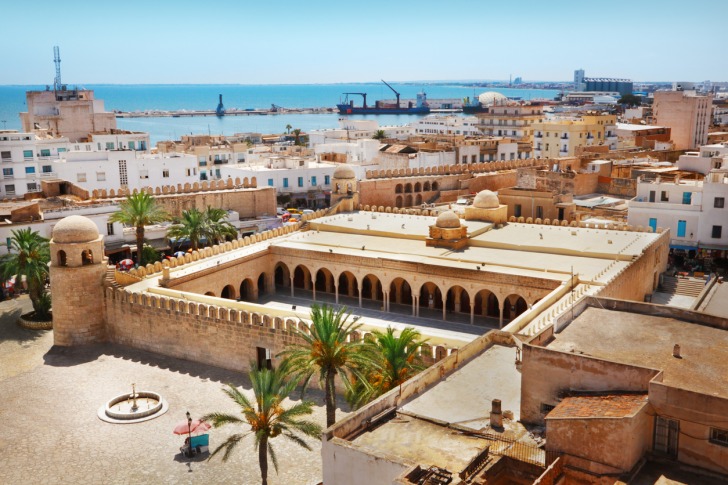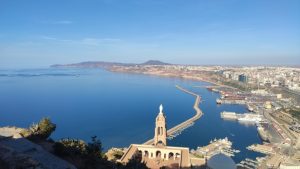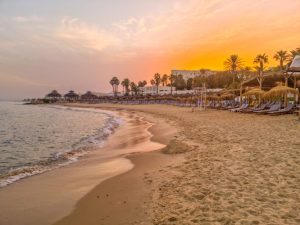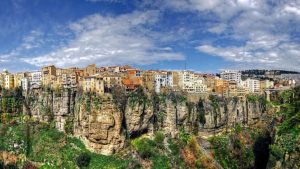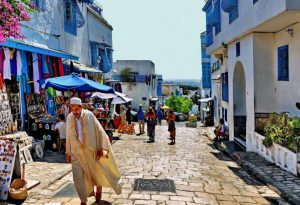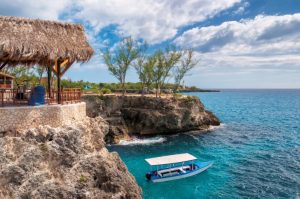 Tunisia : Safety by City
Tunisia : Safety by City
Tunisia - safety as a country Located on the Mediterranean Coastline, Sousse is a resort destination with a wonderful history, excellent food, fantastic shopping or unique items, and pristine beaches.
These city attributes have made it a popular African and international destination.
However, given Tunisia’s location between Libya and Algeria, the country has developed a reputation for not being safe.
Therefore, it’s important to understand the truth about safety in Sousse and Tunisia before visiting.
Keep reading to learn more!
Warnings & Dangers in Sousse

OVERALL RISK: MEDIUM
Sousse is a rather safe place to visit since it’s a well-patrolled resort town. The biggest issues you could encounter are surrounding petty theft like scams and pickpocketing. However, these can be avoided by using your instinct, wearing your wallet or handbag at the front of your body, and politely telling street vendors, “no thank you.”

TRANSPORT & TAXIS RISK: MEDIUM
Public transportation around Sousse is generally safe and reliable. The city has a bus and light rail system that makes various stops around the city and connects to the neighboring cities of Mahdia and Monastir. However, these options can become crowded at peak times, so taxis are a much better option, especially at night when vigilance is required.

PICKPOCKETS RISK: MEDIUM
Petty crimes like bag-snatching and pickpocketing occur, especially in crowded and tourist places. Luckily, the petty crime rate is not excessively high like in other tourist destinations around Africa. This medium risk can be greatly reduced by being vigilant, not flashing valuables in public, and being aware of your belongings.

NATURAL DISASTERS RISK: LOW
Although the northern section of the country is susceptible to flooding, especially in the wet months, it’s not a major concern among locals and visitors. Also, Northern Tunisia is in a seismic zone and susceptible to earthquakes. However, these are not reasons to skip your trip to the beautiful Sousse.

MUGGING RISK: MEDIUM
Although the highest risk of kidnapping and muggings occurs near the Libyan border, they occasionally also occur in Sousse. For this reason, it’s critical to avoid dark and abandoned areas, especially at night, and always be aware of your surroundings. Muggings rarely occur in daylight and seldom occur in populated areas.

TERRORISM RISK: LOW
Tunisian authorities are regularly on alert around cities for terrorist activities. However, most terrorist attacks occur near the Libyan and Algeria borders, not in cities like Sousse, so should not be a major concern when visiting. This doesn’t mean letting down your guard and stopping being vigilant while traveling.

SCAMS RISK: MEDIUM
Unfortunately, some dishonest locals are always looking to scam unsuspecting visitors. Watch out for street vendors attempting to overcharge you for services and sell you poor-quality goods at high prices. Also, always double-check your change when paying in cash, especially in markets.

WOMEN TRAVELERS RISK: MEDIUM
Although Sousse is a friendly and respectful place, there’s some amount of street harassment that could occur in the form of catcalling and inappropriate comments about your appearance. While this is typically a harmless activity that rarely turns into a dangerous situation, it’s always best to ignore these locals and be aware of your surroundings.

TAP WATER RISK: HIGH
Past visitors don’t recommend drinking the Sousse tap water. Although it’s safe for locals and treated by the government, the water contains different bacteria and minerals than what most international visitors are used to resulting in illness or digestive issues. It’s recommended to drink boiled or bottled water, which is readily available and inexpensive.
Safest Places to Visit in Sousse
Generally speaking, Sousse is a safe place to visit and walk around.
While the major tourist sites and beaches attract pickpocketers and scammers, you can avoid these situations by ensuring your credit cards and cash are securely stored in front of your person, and don’t bother with street vendors or others who approach you.
You can venture anywhere in Sousse and find respectful and friendly locals who are used to visitors.
Places to Avoid in Sousse
According to Numbeo, Sousse has a high safety level for tourists walking alone during daylight, but that number drops in half when walking alone at night.
Most visitors recommend sticking to the amenities at the resort or hotel at night, and if you must venture out, have the accommodation call a taxi on your behalf.
While petty criminal activity occurs in the daylight, more dangerous activity starts after the sun goes down, so it’s best to avoid night activities altogether.
If you are out at night, remember not to venture into secluded areas or poorly lit streets.
Don’t take shortcuts through dark parking lots or other open spaces and try to stay close to the hotel.
Also, don’t wander around the beach at night as many criminals are walking around, looking for unsuspecting tourists.
Safety Tips for Traveling to Sousse
- Avoid Large Demonstrations. Although the intent of protests and demonstrations may be non-violent, they can turn violent very quickly. If you see a protest when visiting Sousse, it’s best to walk in the other direction or find a different route to the destination to ensure your safety. Never walk through a protest, as this can have serious consequences.
- Avoid Walking Alone Down Quiet Streets at Night. While this may seem like common sense, never walk down poorly lit, abandoned, quiet streets alone at night, especially females. Opportunistic criminals are regularly waiting in the shadows to prey on unaware visitors. If you end up in a desolate area, calmly turn around and quickly walk to a more populated and safer area.
- Be Aware of your Surroundings. When visiting Sousse, it’s crucial to be aware of your surroundings, especially at night, and know who is around you. While it’s not advisable to wander around at night, if you do, always be vigilant and observe the environment. On public transit, look for suspicious behavior to maintain a safe trip. If you see suspicious activity or baggage left with nobody around, immediately contact the local authorities.
- Don’t Flash Valuables in Public. Tourists often make the mistake of wearing expensive cameras around their necks or sporting high-priced watches and jewelry in public. This makes them an easy target for pickpockets and criminals who are looking for these expensive items. The simple solution to avoid these situations is to not flash valuables in public.
- Keep Your Wallet in Your Front Pocket. When on crowded mass transit or at busy attractions, always keep your wallet and phone in your front pocket. Also, women should keep their purses and handbags at the front of their body. This simple action makes it much more difficult for pickpockets and bag snatchers to fulfill their goals. Also, women should invest in cut-proof handbag straps which further protect their belongings.
- Obey Local Customs. Tunisia is a rather conservative Muslim country, so it’s important to follow the local customs and dress code. For instance, women should always dress modestly by wearing long dresses, covering their shoulders, and wearing a headscarf when visiting religious sites. Although the temperature is stifling in the summer, most men wear jeans or pants year-round, so to blend with the locals, men are advised to dress similarly.
- Only Use Licensed Taxis with a Meter. Although most taxis around Sousse are honest, the unlicensed taxis or those that don’t use the meter are the cabs that will scam you. Always have your accommodation order a taxi to ensure it’s a reputable and licensed company. Also, if there is no meter or it is broken, negotiate the price before sitting in the car.
- Remain Hydrated. The summer temperatures are incredibly hot, often pushing above 100 degrees Fahrenheit. Regardless of whether you are at the beach or just wandering around the city for the day, it’s crucial to remain hydrated with bottled water. Even in the winter with the cooler temperatures, it’s crucial to remain hydrated. Dehydration is one of the highest risks when visiting Tunisia with many visitors ending up in the hospital with hydration IVs every year.
- Use Taxis as an Alternative to Public Transportation. While public transportation is reliable and safe during the day, it can be incredibly crowded, which lends the situation to pickpockets. If you plan to use the light rail or buses during the day at off-peak hours, then it’s a great way to get around town. However, once the sun sets, use a taxi as an alternative as they are reliable and inexpensive. While mass transit isn’t completely safe at night, scammers are around and could follow you down a dark road, which you must avoid at all costs.
- Wear High SPF Sunblock. Similarly, if you plan to spend any time outside, regardless of whether it’s at the beach, in the countryside, or wandering around the city, applying and re-applying high SPF sunblock is essential. Severe sunburns can ruin your trip and are another major risk when visiting Tunisia. With the warm Mediterranean water, you won’t even notice the sun baking your skin, so don’t skip the sunblock.
So... How Safe Is Sousse Really?
Since Sousse is on the coastline, there are many resorts and hotels that dot the beaches.
To bring money into the country, the Tunisian Government has invested in protecting visitors to this city.
Therefore, Sousse is a relatively safe place to visit, but you need to be aware of petty crimes like bag snatching, pickpocketing, and scams.
Like in any destination, this can be avoided by not flashing valuable items in public, keeping your wallet and purse at the front of your body, and always being aware of your surroundings.
Other risks are unlikely to occur unless you travel to the countryside or near the Libyan border.
How Does Sousse Compare?
| City | Safety Index |
|---|---|
| Sousse | 48 |
| Djerba | 53 |
| Tunis | 59 |
| Hammamet | 78 |
| Sidi Bou Said | 42 |
| Bab Bhar | 56 |
| Mahdia | 32 |
| Siem Reap (Cambodia) | 63 |
| Phnom Penh (Cambodia) | 61 |
| Niagara Falls (Canada) | 87 |
| Calgary (Canada) | 82 |
| Buenos Aires (Argentina) | 60 |
| Vancouver (Canada) | 82 |
Useful Information

Visas
The citizens of many Western countries in Europe and others like Canada and the United States, don’t require a visa to enter Tunisia, only a passport that’s valid throughout your stay. However, many other countries require a visa, so it’s important to check with the local State Department to determine if your country is on the list.

Currency
The official currency of the country is the Tunisian Dinar. There are specific government rules surrounding taking a certain limit of the Dinar from the country, so it’s crucial to understand the rules before attempting to leave. Also, when you change money, Tunisian banks will request your passport for documentation purposes. ATMs are readily available around Sousse, and larger establishments and hotels accept international credit cards.

Weather
Sousse is situated on the Mediterranean Coast, which means the summers are hot, often with a nice sea breeze, and winters are comfortable but rainy. The best times to visit are in the spring and fall when the temperatures are not too hot but comfortable enough to still go to the beach and in the water.

Airports
The closest airport to Sousse is Monastir Habib Bourguiba International Airport, which provides domestic and international flights. Since Sousse is a resort city, many international travelers visit to enjoy the sun and beaches. Only around 30 miles away from Sousse is the larger Enidha-Hammamet International Airport, which also offers domestic and international flights.

Travel Insurance
Travel insurance is essential when visiting any international destination, especially Tunisia. In addition to offering financial compensation for lost or delayed baggage and flight cancellations or delays, travel insurance covers medical expenses ranging from a quick trip to the doctor to airlifting from a remote location to the nearest hospital.
Sousse Weather Averages (Temperatures)
Average High/Low Temperature
| Temperature / Month | Jan | Feb | Mar | Apr | May | Jun | Jul | Aug | Sep | Oct | Nov | Dec |
|---|---|---|---|---|---|---|---|---|---|---|---|---|
| High °C | 17 | 17 | 19 | 22 | 25 | 29 | 32 | 33 | 30 | 26 | 21 | 18 |
| Low °C | 9 | 9 | 11 | 14 | 17 | 21 | 23 | 24 | 22 | 19 | 14 | 10 |
| High °F | 63 | 63 | 66 | 72 | 77 | 84 | 90 | 91 | 86 | 79 | 70 | 64 |
| Low °F | 48 | 48 | 52 | 57 | 63 | 70 | 73 | 75 | 72 | 66 | 57 | 50 |
Tunisia - Safety by City
| City | Safety Index |
|---|---|
| Bab Bhar | 56 |
| Djerba | 53 |
| Hammamet | 78 |
| Kairouan Medina | 52 |
| Mahdia | 32 |
| Sidi Bou Said | 42 |
| Sousse | 48 |
| Tunis | 59 |
